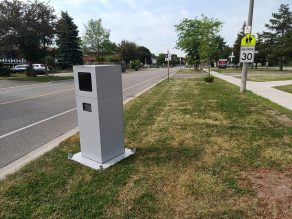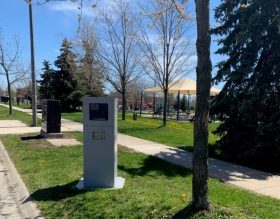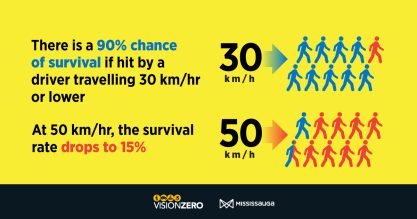Data from City’s speed cameras shows that drivers are slowing down and following the speed limit.
June 27, 2024
The additional 60 semi-fixed cameras will rotate to 100 locations throughout Mississauga. They are mounted on poles with permanent concrete bases and will be placed in busy school zones and other major roadways where fatal and injury collisions occur.
Speed cameras will continue operating in Community Safety Zones with speeding issues. Priority will be given to sites with major speeding concerns, considering traffic, sidewalks, cycling facilities, pedestrian hotspots like schools and parks, and past collisions.
The proposed timing of the new camera deployments are as follows:
- 2024 – Five new cameras
- 2025 – 10 new cameras
- 2026 – 15 new cameras
- 2027 – 15 new cameras
- 2028 – 15 new cameras
Speed camera tickets
Since July 2021, 82,000 tickets have been issued. The highest number of tickets were issued on Truscott Drive, west of Lorne Park Road. The highest ticketed speed was 78 km/h, almost 50 km/h over the posted speed limit. This has occurred at nine different locations.
There have also been 207 Part III offences processed to date, for vehicles travelling at 50km/h or more over the posted speed limit. The highest ticketed speed being 114 km/h on Mississauga Valley Boulevard, west of Central Parkway East.
Transition to Administrative Penalty System
The City will be shifting from the Provincial Offence Act (POA) to the Administrative Penalty System (APS) in 2025 for speed camera offences to help reduce administration burdens. This will help make speed camera enforcement programs more sustainable and allow for growth in the future.
Planning is currently underway to ensure a smooth transition and effective implementation. Staff are drafting a new Administrative Penalty By-law to allow for speed cameras to operate under APS. The City is also looking to establish a City-run process center in 2025 to support and expand the capacity of the speed camera program.
Corporate policy for Community Safety Zones
The City is developing a Corporate Policy for Community Safety Zones to ensure that speed cameras continue to be used as intended – to reduce vehicle speeds and collisions, especially in areas with a higher volume of vulnerable road users. This policy will consider factors like speed, collision history and the presence of sidewalks, cycling facilities, schools, parks, playgrounds and recreation areas.
The speed camera program is one of the 99 action items in the Vision Zero Action Plan helping the City reach zero fatal and serious collisions in Mississauga. In addition to the speed cameras, the City is continuing to implement several traffic calming measures like speed humps, lowered speed limits in neighbourhood streets and school zones, a crossing guard program to help students cross the road and fines for drivers stopping or parking in bike lanes.
Learn more about the speed camera and results.
Learn more about our speed cameras and view a map of active and future locations at mississauga.ca/ASE
About Automated Speed Enforcement
The Automated Speed Enforcement (ASE) program aims to increase road safety, reduce speeding and increase speed limit compliance on neighbourhood streets, improving safety for everyone. All speed cameras have a camera and a speed measurement device to help enforce speed limits in school area community safety zones.
When a vehicle exceeds the posted speed limit, the speed camera captures an image. Then, a provincial offences officer reviews the image and issues a ticket. The ticket, including a digital copy of the image and an enlargement of the license plate, is mailed to the registered plate holder within 30 days of the offence. Upon conviction, the owner of the vehicle receives a fine, but no demerit points are applied.
Quotes
“Our speed cameras are working. Drivers are changing their behaviour and slowing down. Slowing down not only reduces your risk of collision, it also lowers the severity of injuries for vulnerable road users like pedestrians, cyclists and transit users. If you’re driving in Mississauga, whether there is a speed camera or not, I urge you to slow down and follow the posted speed limits.” – Mayor Carolyn Parrish
“Our speed cameras can detect speeding on a consistent basis, ensuring that school children and other road users always feel safe. That’s why we are expanding our program. With an additional 60 speed cameras, our roads will continue to be safe for all road users, regardless of if you’re walking, cycling, using an e-scooter or e-bike, taking transit or driving.” – Geoff Wright, City Manager and CAO



